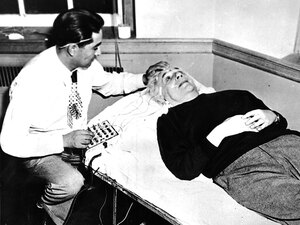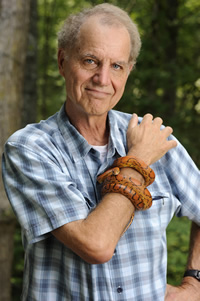A resource for any teacher of high school psychology, whether AP, IB or Introduction to Psychology
Wednesday, September 29, 2010
Zimbardo cancels NCSS appearance - but vows to be there next year
First, the cancellation has nothing to do with any lack on enthusiasm for social studies or psychology, as Dr. Zimbardo indicated that he "has already committed to next year in DC" where the conference will be held in December 2011. The conflict has to do with the success of his new project, Heroic Imagination, which is described on its website as the realization of Dr. Philip Zimbardo's vision for an organization dedicated to creating a global community of heroes through education, research, media, and public engagement campaigns." Dr Z. will be in Mexico in November at a conference celebrating innovations in humanity where he "won their prize last year for [his] lecture on creating every day heroes." As part of that award, 50 high school students were given awards to attend the conference with Dr. Zimbardo on what he described as "establishing eco-hero projects in their schools."
What ultimately led to his withdrawal from the NCSS conference was a lack of flexibility in getting travel accommodations from Mexico to Denver. Under perfect conditions he could only get from one place to the other with minutes to spare, and given the amount of air traffic delays and cancellations these days, he knew the chances were slim of getting to the NCSS conference in time and he would most likely have had to pull out with virtually no notice with any delay.
But cheer up! First, Dr. Z. is working to make the world a better place, so who can argue with that? Second, he's committed to DC next year. And third, as Daria noted, there are already some amazing psychology sessions lined up in Denver, including these on Friday and Saturday. I look forward to hearing reports in November - please e-mail me (Steve) with your experiences!
Psychology: Vistas, Visions, Voices, and Vital Active Learning Demonstrations with psychology teacher rock-stars Charlie Blair-Broeker (IA) and Randy Ernst (NE)
Teaching Psychology as a Journey of Discovery Using Self-Report Questionnaires with Stephen Franzoi of Marquette University
Mile-High Psychology with teachers Daria Schaffeld and Joe Geiger (IL)
Visions and Voices on Television: Making Psychology Concepts Come Alive with teacher Patricia Baima (IL) and Cynthia Prehar of Framingham State University
Classroom Motivation Knowledge and Skills for the 21st Century with Lee Morganett of Indiana University Southeast
Cross-Curricular Lesson Planning and Psychology: Reaching a 21st Century Learner with teacher Sean Tischler (DE)
A Voice from the Past—A Vision for Hope with Ted Englemann (lecturer, photographer, educator, and veteran of the war in Vietnam)
Creating and Supporting an AP Learning Community for All Students with Sabrina Ehmke, Matthew Walsh, and David Allen (IL)
Teaching Happiness, Building Global Citizens with Ellie Ford and Abigail Konopasky, Project Happiness
Tuesday, September 28, 2010
Sim Daltonism - Color Blindness Simulation

The name of this program is a complete mystery to me, but its a VERY slick little color blindness simulation program. Many websites provide still pictures (or videos) that try to show the impact of color blindness, but this program simulates color blindness with anything on your screen (with adjustments for different kinds of color blindness). Might also be useful to some student research projects investigating the impact of color changes on perception of still images, videos, etc.?
Sim Daltonism download site: http://michelf.com/projects/sim-daltonism/
posted by Rob McEntarffer
Einstein's Brain
 This last June (2010), National Public Radio did a report on the whereabouts of Einstein's Brain. The story details, believe it or not, the travels of the brain since Einstein's death over fifty years ago. On many levels, the history of the brain is both interesting and a bit sad that the brain of whom many believe to be the most intelligent person of the twentieth century, was not studied for its secrets but sat in a jar on a shelf.
This last June (2010), National Public Radio did a report on the whereabouts of Einstein's Brain. The story details, believe it or not, the travels of the brain since Einstein's death over fifty years ago. On many levels, the history of the brain is both interesting and a bit sad that the brain of whom many believe to be the most intelligent person of the twentieth century, was not studied for its secrets but sat in a jar on a shelf.To hear the broadcast from June or read a transcript of the report, go to http://www.npr.org/templates/story/story.php?storyId=126229305
A special thanks to Corey Kirsch, Waukesha South High School, Waukesha, WI for sending this link to the Teaching High School Psychology Blog. If you have ideas for a posting, please send them to kkorek@germantown.k12.wi.us
Monday, September 27, 2010
2010 CHI-TOPSS Conference - October 22nd

Dear Psychology Teacher,
We are looking forward to seeing you at this year’s Chicago Teachers of Psychology in Secondary Schools (CHITOPSS) conference on Friday, October 22, 2010 at Lincoln-Way Central High School in New Lenox, IL. The annual CHITOPSS conference provides an opportunity for psychology teachers from all over the Chicagoland area and beyond to exchange ideas and teaching strategies, discuss the AP test, and “talk shop” with other psychology teachers.
Breakfast and registration will be from 8:30 – 9:00 followed by several sessions of best practices and, of course, lunch. There will be a $25 fee for each teacher attending the conference. If more than one teacher from your school or district is planning to attend, you are more than welcome to send one check for everyone. Payments should be made by October 15 and addressed to Lincoln-Way Central High School, 1801 E. Lincoln Hwy., New Lenox, IL 60451. Please direct attention to Bobbi Pehle.
The conference is open to all psychology teachers, and we welcome everyone to share their best ideas. Please email Bobbi Pehle at rpehle@lw210.org with your presentation topic. For those who have never been to a CHITOPSS conference before, our format is extremely laid back so please bring something to share. If you have a handout, please bring enough copies for everyone. I will email a number to everyone presenting as we get closer to the conference.
Registration will take place just inside the main doors. Parking should be roped off for the conference near the front of the building. You can find directions at: http://www.lw210.org/Central/about/directions.php. I know traffic will be a potential problem for those of you coming from the northern suburbs. Please feel free to contact either of us if you have any questions, and send this along to anyone that might not be on the email list as we will not be sending out formal invitations through the mail.
Regards,
Bobbi Pehle
Matt Bowden
mbowden@lw210.org
APA Psychology Posters
 The American Psychological Association's Education Directorate has produced four posters for classroom use. The posters can be downloaded off the APA's website and then printed. For more information, with links to the posters, go to http://www.apa.org/ed/precollege/undergrad/classroom-posters.aspx.
The American Psychological Association's Education Directorate has produced four posters for classroom use. The posters can be downloaded off the APA's website and then printed. For more information, with links to the posters, go to http://www.apa.org/ed/precollege/undergrad/classroom-posters.aspx.I (Kent) would like to thank Daria Schaffeld (daria.schaffeld@d214.org), Prospect High School, Mt. Prospect, IL for providing the original idea behind this posting and all the work she has done as the NCSS Psychology Community Chair.
Sunday, September 19, 2010
Your input needed on possible changes for psych teachers
1) There is some question as to whether high school psychology will become included in the group known as STEM subjects - that is, Science Technology Engineering and Mathematics. If psych is included, what might be the ramifications to high school teachers from your perspective? Would there be a push to make psychology and psych teachers part of the Science department instead of Social Studies? If so, how would you view this change and how might it affect you?
2) Do current teachers of psychology (all levels: regular, AP, and IB) believe that a separate statistics course (like Statistics 101) should be a required undergraduate course for a teacher to be certified in psychology? Are the statistics that usually accompany a psychology department "Research Methods" course enough statistics for a new certification in psychology? (This would be for future teachers; current teachers would be grandfathered in.)
These kinds of questions are being asked of APA and TOPSS from multiple sources, so your input would be very much appreciated. Please post your thoughts in the comments below or you can send them directly to me at ashejones@gmail.com.
(And I might add: STEM is a very big buzzword in education funding these days, so there may be real implications to psychology being considered one of the STEM courses.)
-- posted by Steve
Saturday, September 18, 2010
An interview with Hal Herzog - and a chance to win his book!
I'm excited to announce that Dr. Herzog has agreed to do the first-ever THSP author interview. Here's how it will work:
1) Check out the links below and then post a question about Dr. Herzog's book and work in the comments. Be SURE to include your e-mail address! You have until Sunday 9/26 to post a comment.
2) Dr. Herzog will select a few of your questions to answer and will send me his replies for a follow-up post.
3) At the end of that post I'll announce the winner of a free copy of Some We Love, Some We Hate, Some We Eat. I'll determine that winner by taking the number of comments and selecting one number by using a random number selector online. (Note: if the person with the winning comment doesn't include an e-mail address, I'll randomly select another number.)
Here are some links with more on Dr. Hal Herzog:
Halherzog.com
The State of Things audio interview (from WUNC in Chapel Hill)
An interview in Salon and a column in the New York Post
Remember, post your questions in the comments below by Sunday 9/26.
--posted by Steve
Sunday, September 12, 2010
Availability Heuristic Example--What Parents Worry About
 Statistics are a funny thing-the media coverage of them can skew our perceptions. Today NPR posted a blog about worries parents should and should not have called, " 5 Worries Parents Should Drop, And 5 They Shouldn't. The top five that parent should not worry about are kidnapping, school snipers, terrorists, drugs, and strangers.
Statistics are a funny thing-the media coverage of them can skew our perceptions. Today NPR posted a blog about worries parents should and should not have called, " 5 Worries Parents Should Drop, And 5 They Shouldn't. The top five that parent should not worry about are kidnapping, school snipers, terrorists, drugs, and strangers. The blog describes why parents may focus upon these ideas--examples are more readily available in their minds than examples of things to worry about, car accidents, homicide (from people they know), abuse, suicide, and drowning. The blogger made a great point--perhaps every media story about an event should give the relative occurrence of a specific event. Reading the comments from the blog brought up some pertinent points.
On a related note, perhaps coaches should give kids and parents the stats on becoming a pro player in their respective sports. Dominance or excellence at the local level does not ensure an athlete (or student) becoming just as successful at the next level.
Posted by Chuck Schallhorn
Friday, September 10, 2010
Children See. Children Do
This is a nice follow-up to Steve's post on Bandura from last fall.
Posted by Chuck Schallhorn
Thursday, September 9, 2010
News on AP Psychology
- This summer, for the first time, AP teachers were able to find their student's AP exam scores online. For the most part, the process worked extremely well and was, in my opinion (Kent), a hundred times better than waiting for the paper reports. Make sure to look over the Instructional Planning Report in addition to the scores. Go to https://scores.collegeboard.com for more information.
- After maintaining the same fee structure for some time, the cost for an AP exam (2011) was increased to $87. For detailed information on the fee structure http://apcentral.collegeboard.com/apc/public/exam/calendar/190165.html
- For those of us in AP Psychology, many feel the biggest change this year has been the moving of the AP Psyc exam date from the second Tuesday to the first Monday of AP testing. Last year the AP Psychology exam was on May 11th. The 2011 exam is scheduled for May 2nd. Please be aware, if your school's spring break is based on Easter, May 2nd might be the Monday students come back from break. For a complete schedule of AP exams go to http://apcentral.collegeboard.com/apc/public/exam/calendar/index.html
- To download the new AP Psychology Course Description Book for Fall 2010 (Acorn Book) go to http://apcentral.collegeboard.com/apc/public/repository/ap-psychology-course-description.pdf I have not had the opportunity to look for changes in this edition of the book. Please feel free to leave any changes you have found in the comments section of this posting.
- No doubt the largest change for AP teachers and students as a whole, is the removal of the quarter point deduction for an incorrect answer. Starting in 2011, a student's score will be based only on how many questions they get correct. For more information on this change and revised worksheets for scoring the 2004 and 2007 released AP Psychology exams, go to http://apcentral.collegeboard.com/apc/public/courses/212187.html
- AP Central now includes a link to PDF copies of the 1994 and 1999 AP Psychology Released Exams at http://apcentral.collegeboard.com/apc/public/courses/213057.html
- Below is a listing of the currently scheduled College Board one-day workshops throughout the country for the 2010-2011 school year. Click on the workshop title for more information on that specific workshop. Click on the location for a link to Yahoo maps.
There is an Institutes and Workshop page at AP Central http://apcentral.collegeboard.com/apc/Pageflows/InstitutesAndWorkshops/InstitutesAndWorkshopsController.jpf where you can search for a workshop by topic, date, and location.
Wednesday, September 8, 2010
Maslow's Views: Distorted Humorously
The rest of the collection can be found at this website. Use and share as you see fit. I have permission from the author(s) at http://lunchbreath.com to post this here. Thanks to them for permission and for being creative with Maslow.
posted by Chuck Schallhorn
Tuesday, September 7, 2010
TOPSS Toolbar-Cool New Browser Tool
posted by Chuck Schallhorn
Wednesday, September 1, 2010
The First Day of 2010-2011 School Year
 While I (Kent) am completely aware many of you following this blog have been back in school for some time, today was our first day of classes at Germantown High. In the infinite wisdom of our state (WI), students cannot legally start before September 1st.
While I (Kent) am completely aware many of you following this blog have been back in school for some time, today was our first day of classes at Germantown High. In the infinite wisdom of our state (WI), students cannot legally start before September 1st.That being the case, my summer hiatus from school has come to a rapid close as well as the break I've taken from this blog. I'm looking forward to another school year with my AP Psychology students and the opportunity to dialog with my psychology colleagues from around the world (approximately 20% of our visitors come from outside the US).
Last year at this time I introduced the Midnight Postings. My hope was to present some useful ideas for your classrooms and bring a sense of continuity to the hodgepodge of thoughts and ideas that normally is found in many blogs. As the THSP blog is a year and a half old with a strong base of followers, I would like to return to the free-flowing nature of postings.
The "Stranger Paper" is an assignment I present the first day of every year. Very early in the class period, usually right after I have introduced myself, I ask the students to find someone in the classroom that they don't know or don't know very well. At this point many students think we are doing the prep work for some type of "boundary breaking" activity where I will ask them to interview this stranger and then introduce them to the class. Imagine their surprise when I tell them for the next few days I want them to watch this person and eventually write a paper about their personality characteristics. I stress the paper should NOT be a simple listing of what the person wore and did but conclusions about their stranger based on those observations.
The students seems to find the paper interesting and a bit of a challenge. In time, we can discuss the limitations to naturalistic observation and the tentative nature of their conclusions. The paper creates a sense of excitement that separates AP Psychology from the other classes that spent the first day going over the syllabus and classroom rules.
Please feel free to contact me if you have any questions about the Stranger Paper.



